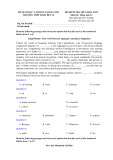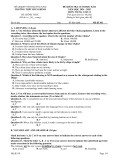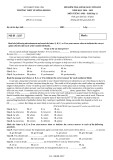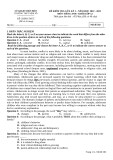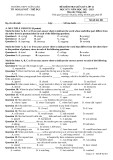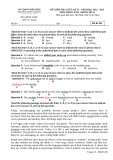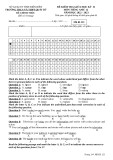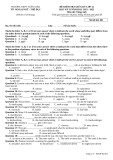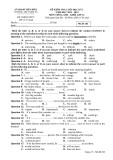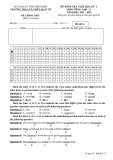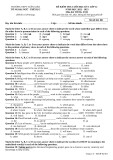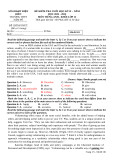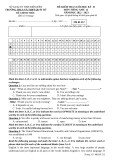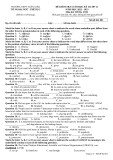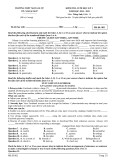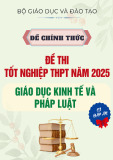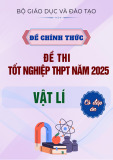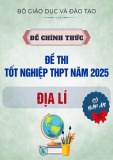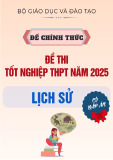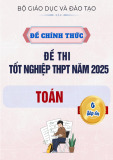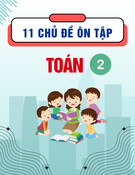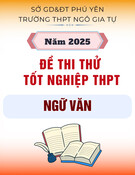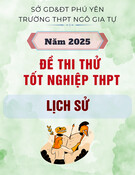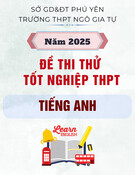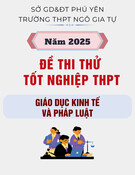Ở
Ề
Ố
Ọ
S GD&ĐT VĨNH PHÚC
Ế
Đ KSCL THPT QU C GIA NĂM H C 2016 – 2017 MÔN: TI NG ANH 12
Ề MÃ Đ : 392
ọ
ố
H , tên thí sinh: ……………………………………………………………………. S báo danh: ………………..
B. groups B. stopped D. goods D. returned
D. precede D. apologize B. follow B. employ
Mark the letter A, B, C or D on your answer sheet to indicate the word whose underlined part differs from the other three in pronunciation in each of the following questions. C. systems Question 1. A. letters Question 2. A. missed C. washed Mark the letter A, B, C or D on your answer sheet to indicate the word that differs from the other three in the position of primary stress in each of the following questions. C. offer Question 3. A. listen Question 4. A. maintain C. sacrifice Mark the letter A, B, C, or D on your answer sheet to indicate the underlined part that needs correction in each of the following questions. Question 5. The last story was as interested as the other ones.
A. interested B. was C. ones D. as Question 6. She created a great impression at the party when she was colorful dressed. A. was B. at C. colorful D. created
Question 7. The Massachusetts State Hour, that was completed in 1798, was the most famous building in the United States at that time. A. the most famous B. The C. at D. that
Mark the letter A, B, C, or D on your answer sheet to indicate the correct answer to each of the following questions Question 8. A ________ certificate is an official statement that two people are husband and wife.
A. birth B. academic C. death D. marriage
Question 9. Most men, when questioned, would welcome the opportunity to date and get married ____ a beautiful woman. A. about B. in C. to D. with Question 10. The _________ rate in urban areas was twice as much as the rate in rural areas. A. unemployed B. unemployment C. employee D. employer Question 11. Sheila, ________ job involves a lot of travelling, is away from home a lot. A. that B. whom C. who D. whose Question 12. I remember that whenever my uncle visited us, he _______ a lot of fruit. A. would bring B. will bring C. will have brought D. brings Question 13. The host asked Peter ________ tea or coffee. A. that he preferred B. what did he prefer C. if he prefers D. whether he preferred
Question 14. If you had saved some money, you ________ so hard up now. B. won't be A. wouldn't have been C. wouldn't be D. aren't
Question 15. The job ________ is very important because it's an opportunity for the employer to figure out if you're right for the job. A. market B. qualification C. interview D. vacancy Question 16. "When did you come here" "I ________ here since August" A. had been B. was C. have been D. have been being Question 17. In many families in Vietnam, everyone has to ________ their share of the household chores. A. divide B. do C. have D. make Question 18. According to FAO, Vietnam is ________ second largest coffee producer in the world after Brazil.
Trang 1/4 – Mã đề 392
A. a B. the C. an D. Ø Question 19. The youth's responsibility is to ________ to the country's development. A. approach B. contribute C. determine D. maintain
Mark the letter A, B, C, or D on your answer sheet to indicate the most suitable response to complete each of the following exchanges. Question 20. Hung: "I have bought you a toy. Happy birthday to you!" Quan: "__________________"
A. The same to you. C. Have a nice day! B. What a lovely toy! Thanks. D. What a pity!
Question 21. Peter is talking to his neighbor, Tom. Peter: "Would you mind posting the parcel for me? Tom: "__________." A. Don't mention it C. Not at all. I'll do it today B. Yes, I would. I'll do it now D. You are welcome
Mark the letter A, B, C, or D on your answer sheet to indicate the word(s) CLOSEST in meaning to the underlined word(s) in each of the following questions. Question 22. When being interviewed, you should concentrate on what the interviewer is saying or asking you.
A. be related to B. pay attention to C. express interest to D. be interested in
Question 23. Professor Berg was very interested in the diversity of cultures all over the world. D. number B. conservation C. changes A. variety
Mark the letter A, B, C, or D on your answer sheet to indicate the word(s) OPPOSITE in meaning to the underlined word(s) in each of the following questions. Question 24. I could see the finish line and thought I was home and dry. B. hopeless
A. unsuccessful D. successful C. hopeful Question 25. "Mary, I think these clothes are inappropriate for this important celebration." A. suitable B. improper C. attractive D. available
Mark the letter A, B, C or D on your answer sheet to indicate the sentence that is closest in meaning to each of the following questions. Question 26. The last time I went to the zoo was a year ago.
A. A year ago, I often went to the zoo. C. At last I went to the museum after a year. B. I have not been to the zoo for a year. D. I have not gone to the zoo for a year. Question 27. "How beautiful is the dress you have just bought!" Peter said to Mary.
A. Peter asked Mary how she had just bought her beautiful dress. B. Peter said thanks to Mary for her beautiful dress. C. Peter complimented Mary on her beautiful dress. D. Peter promised to buy Mary a beautiful dress.
Question 28. It was your assistance that enabled us to get achievement. A. Your assistance discouraged us from getting achievement. B. But for you assistance, we couldn't have got achievement. C. If you assisted us, we couldn't get achievement. D. Without your assistance, we could get achievement.
Mark the letter A, B, C or D on your answer sheet to indicate the sentence that best combines each pair of sentences in the following questions. Question 29. Mt. Everest is the highest mountain in the world. It's in the Himalayas.
Trang 2/4 – Mã đề 392
A. Mt. Everest is the highest mountain in the world, it's in the Himalayas. B. Mt. Everest is the highest mountain in the world, in the Himalayas. C. Mt. Everest, the highest mountain in the world, is in the Himalayas. D. Mt. Everest is the highest mountain in the world, is in the Himalayas. Question 30. My brother can't find a job. He is very wellqualified.
A. My brother can't find a job, and he is wellqualified. B. My brother can't find a job even though he is very wellqualified. C. My brother can't find a job, but he is very wellqualified. D. My brother can't find a job because he is very wellqualified.
Read the following passage extracted from Oxford Advanced Learner's Encyclopedic Dictionary and mark the letter A, B, C or D on your answer sheet to indicate the correct word for each of the blanks
The most usual way to entertain friends at home is to invite them for a meal, either in the evening (31) _______ at
lunchtime on a Sunday.
When guests are invited for a meal, they often sit and chat while they have a drink (32) _______ the meal, and coffee is usually served afterwards. Several friends are sometimes invited at once to make a small party. These parties are almost always informal. Formal occasions, when (33) _______ invitations are sent out and people dress formally, rarely take place in people's homes, although they did in the past.
B. but B. during B. written B. with
Larger parties are arranged to celebrate a particular event. Children's birthdays are often celebrated (34) _______ a teaparty for the child's friends. The meal will often be followed by party games. Parties are held to celebrate a person's coming of age, a couple's silver wedding anniversary, a couple's engagement and New Year's Eve. A (35)_______ party is sometimes held to invite friends to one's new home. Question 31. A. and Question 32. A. while Question 33. A. writing Question 34. A. by Question 35. A. housewarming B. house warm
D. or D. after D. wrote D. of D. warming house C. nor C. before C. write C. without C. warm house
Read the following passage Extracted from Succeed in Cambridge CAE 10 Practice Tests and mark the letter A, B, C or D on your answer sheet to indicate the correct word for each of the blanks.
By the summer of 2007 England is set to be almost smokefree, with a total ban on smoking in all public places and that includes those designated smoking rooms in the office. Does this spell the end of smoking feuds in the workplace?
Eleven per cent of non smoking adults are exposed to tobacco smoke at work. Approximately 700 people a year die from lung cancer or stroke because of passive smoking at work. Bar and pub workers account for a large proportion of these statistics, but this is a problem for office workers too. Smoking in the workplace has been a growing issue of contention for quite some time, becoming one of the most emotive and potentially damaging to office harmony and the biggest issue in the office rights' battle. And now that the nonsmokers have won the battle with a total ban, what effect will this have in the office?
Until the new law comes into being, employers can provide their workers with specifically designated smoking area within their office. But not all offices are so accommodating. For those who send their smoking employees outside, the source of friction the fag break remains, which can prove problematic for company productivity. In 1996, one study estimated that lost productivity due to smoking was costing employers in Scotland more than £1.2 million per day, or £292 million per annum. Question 36. The word "designated" is closest in meaning to ____________.
A. managed B. taken C. ordered D. chosen Question 37. According to the passage, which of the following is NOT true for smoking in the workplace?
A. Becoming one of the most emotive and potentially damaging to office harmony B. Bringing about the office harmony C. Growing issue of contention for quite some time
Trang 3/4 – Mã đề 392
D. Becoming the biggest issue in the office rights' battle
Question 38. Approximately 700 people a year die from lung cancer or stroke ______________.
A. because they go to bars or pubs often C. even they don't like smoking B. because they smoke at work D. even they don't smoke at work Question 39. According to the passage, the following are true EXCEPT ___________.
A. Smoking in the workplace has brought about the office harmony B. 11 percent of adults who don't smoke are exposed to tobacco smoke at work. C. Passive smoking can cause lung cancer or stroke D. Bar and pub workers are exposed to tobacco smoke at work most Question 40. The word "this" in the second paragraph refers to __________. B. the battle A. a total ban C. an effect D. the office Question 41. Not all offices are so accommodating to the new law because ___________.
A. it can make the office rights' battle worse B. they can't punish their employees who go out to smoke C. they do not have enough accommodation D. it can cause the loss in company productivity
Question 42. The word "those" in the third paragraph refers to __________. B. offices A. employees C. employers D. workers Question 43. What is the main topic of the reading passage?
A. Passive smoking C. Smoke in the work place B. How to punish the smokers at work D. Consequences of smoking
Read the following passage extracted from Recycling Advanced English and mark the letter A, B, C or D on your answer sheet to indicate the correct answer for each of the questions.
Education was not formally integrated into European Union policy portfolio until the 1993 Maastricht Treaty, although the first Community legislation with an impact on the education sector was adopted as long as the 1960s. These early laws dealt with mutual recognition of qualifications. Achieving recognition by one member state of a qualification obtained in another was an important precondition for implementing the free movement of workers.
Citizens of EU countries who are students now enjoy the same rights of access to higher education in all member states as they do in their home country, provided that they have the relevant qualifications for entry. Growing numbers of students exchange activities have been developed, of which the oldest and most famous is the 1987 Erasmus program. By recognized course credits, Erasmus allows university students to study for one year in a different member state. A separate program, Leonardo, gives young school leavers, students and graduates the chance to receive vocational training.
Few EU initiatives enjoy such wholehearted and widespread political support as these higher education programmes. The key issue for future initiatives is to build on this success without being overambitious. Unfortunately, these programmes are becoming very expensive, and this is now the primary focus of concern.
Question 44. The important point of the 1993 Maastricht Treaty is ______________.
A. to provide qualifications to one member state C. to make qualification recognized B. to join European Unity policy portfolio D. to make allowance for the worker's free movement Question 45. What is the main idea of the reading passage?
A. Education in European Union countries C. The Leonardo program B. The 1987 Erasmus program D. The 1993 Maastricht Treaty Question 46. According to the passage, the oldest program for students in EU is __________.
A. the 1987 Erasmus program C. the 1993 Maastricht Treaty B. the first Community legislation D. the Leonardo program
Question 47. The word "they" in the second paragraph refers to __________. A. EU countries B. member states C. rights D. students Question 48. Education was formally integrated into European Union policy portfolio ________. A. in the 1993 Maastricht Treaty B. before the 1993 Maastricht Treaty
Trang 4/4 – Mã đề 392
C. in the 1960s D. before the 1960s Question 49. According to the passage, the following are true EXCEPT ___________.
A. Leonardo provides students the chance to receive postgraduate training. B. European citizens who are students can access to higher education in all member states. C. Erasmus allows university students to study for one year in a different member state. D. The 1987 Erasmus program is the program for students exchange activities.
Question 50. The word "widespread" is closest in meaning to ____________. A. everywhere B. all over the world C. on a large scale D. on the small scale
____THE END____
ượ ử ụ
ệ
ộ
ả
Thí sinh không đ
c s d ng tài li u. Cán b coi thi không gi
i thích gì thêm.
Trang 5/4 – Mã đề 392
Ở
Ề
Ố
Ọ
S GD&ĐT VĨNH PHÚC
Đ THI KSCL THPT QU C GIA NĂM H C 2016 – 2017 Ế MÔN: TI NG ANH
ượ ử ụ
ệ
(Thí sinh không đ
ọ
c s d ng tài li u) ố
H , tên thí sinh: …………………………………………………. S báo danh: ………………..
Đáp án mã đề: 392
01. B; 02. D; 03. D; 04. C; 05. A; 06. C; 07. D; 08. D; 09. C; 10. B; 11. D; 12. A; 13. D; 14. C; 15. C; 16. C; 17. B; 18. B; 19. B; 20. B; 21. C; 22. B; 23. A; 24. A; 25. A; 26. B; 27. C; 28. B; 29. C; 30. B; 31. D; 32. C; 33. B; 34. B; 35. A; 36. D; 37. B; 38. D; 39. A; 40. A; 41. D; 42. C; 43. C; 44. D; 45. A; 46. A; 47. D; 48. A; 49. A; 50. C;
Trang 6/4 – Mã đề 392



